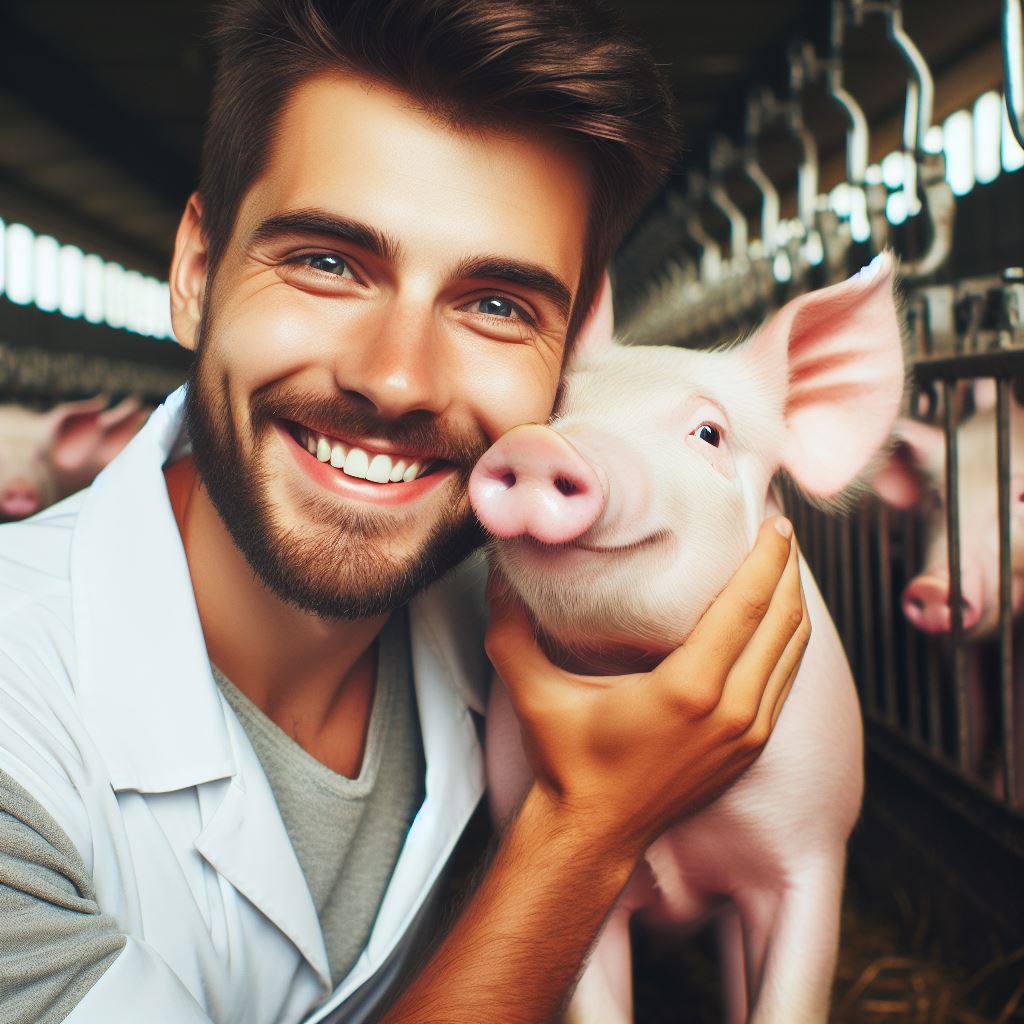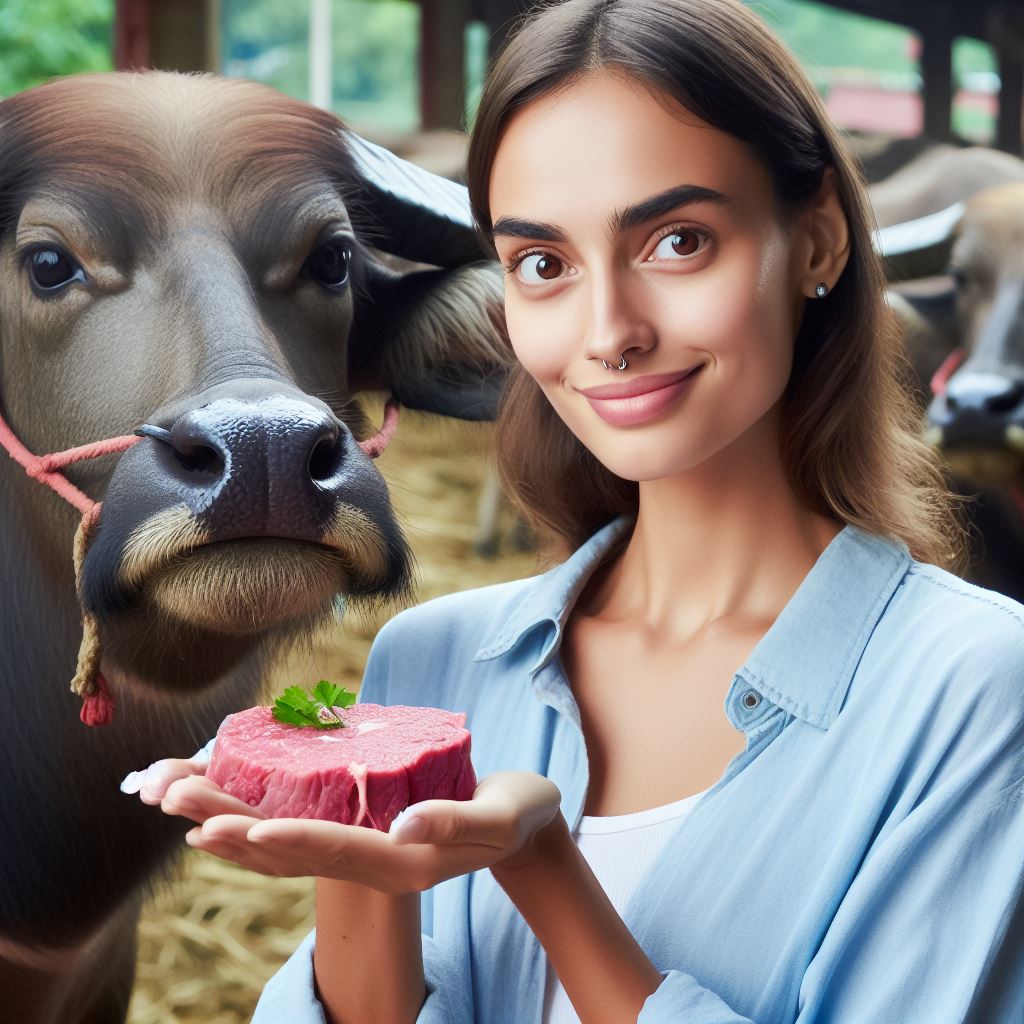Introduction
Let’s explore Swine Genetics Pig Health and Yield.
Swine genetics serves as a cornerstone in modern pig farming, influencing health and productivity.
Ongoing innovations in breeding techniques empower farmers to enhance desirable traits and optimize yield.
Strategic selection and precision breeding methods enable the development of pig breeds with superior characteristics.
Genetic considerations extend to bolstering disease resistance, reducing the need for antibiotics and ensuring healthier herds.
The economic viability of pig farming is profoundly shaped by the genetic makeup of the swine population.
Adapting genetics to meet market demands ensures that swine breeds align with consumer preferences and industry requirements.
In this exploration of swine genetics, we delve into the critical role genetics plays in shaping the future of pig farming.
Understanding Swine Genetics
Definition of swine genetics
Swine genetics refers to the study of inherited traits in pigs, including their physical characteristics, health, and productivity.
Explanation of how genetics influence various traits in pigs
- Coat color: Different genes determine the color of a pig’s coat, such as black, white, or spotted.
- Growth rate: Genetic factors determine how fast a pig will grow, affecting its weight and size.
- Disease resistance: Some pigs inherit genetic traits that make them more resistant to certain diseases.
- Reproductive performance: Genetic makeup influences the fertility and litter size of sows, impacting overall productivity.
- Meat quality: Genetics play a crucial role in determining the tenderness, marbling, and flavor of pork.
Overview of the role of genetics in pig health and productivity
- Disease prevention: Selective breeding can help develop genetic lines with natural resistance to specific swine diseases.
- Improved feed efficiency: By selecting pigs with superior genetic traits, producers can reduce feed costs and increase profitability.
- Enhanced carcass quality: Genetic selection can improve meat quality traits, such as leanness and marbling, meeting consumer demands.
- Higher reproduction rates: Genetics play a vital role in enhancing the reproductive performance of sows, leading to increased litter sizes.
- Higher growth rates: Through genetic selection, pigs can be bred to have faster growth rates, resulting in higher market weights.
- Consistency in performance: By using genetics to select breeding stock, producers can ensure more predictable and uniform pig performance.
- Adaptation to environmental conditions: Genetic variability allows swine to adapt to different climates and management practices.
- Reduced reliance on antibiotics: Genetic selection for disease resistance can help reduce the need for antibiotic use in pig production.
- Sustainable production: Swine genetics can contribute to more efficient resource utilization, reducing the environmental impact of pig farming.
- Future advancements: Ongoing research in swine genetics aims to further improve traits such as feed efficiency, disease resistance, and meat quality.
In general, understanding swine genetics is crucial for enhancing pig health and productivity.
It involves studying inherited traits that influence various aspects of pig production, such as coat color, growth rate, disease resistance, and reproductive performance.
Genetic selection plays a significant role in improving traits related to pig health, meat quality, reproduction, and overall productivity.
By harnessing the power of genetics, pig farmers can ensure sustainable and profitable pig farming operations while meeting consumer demands for high-quality pork.
Ongoing research in swine genetics holds promise for future advancements in the industry.
Read: Turkey Genetics: Raising Robust Birds
Transform Your Agribusiness
Unlock your farm's potential with expert advice tailored to your needs. Get actionable steps that drive real results.
Get StartedSelecting the Right Genetics
Discussion on the importance of selecting the right genetics for pig breeding
Selecting the right genetics for pig breeding is crucial for achieving desired health and yield outcomes.
- Maximizing Health: Optimal genetics contribute to disease resistance, ensuring the well-being of pig populations.
- Yield Optimization: Strategic genetic selection enhances traits related to meat quality, improving overall productivity.
- Reproductive Efficiency: Choosing the right genetics influences reproductive capabilities, affecting litter size and breeding success.
- Feed Conversion: Genetic factors play a role in efficient feed utilization, directly impacting the economic feasibility of pig farming.
- Resistance to Stress: Proper genetics can enhance the resilience of pigs, minimizing the impact of stressors on their health.
- Adaptability to Environment: Selecting genetics suited to specific environmental conditions promotes adaptability and reduces the risk of health issues.
In this discussion, we explore the pivotal role of genetics in pig breeding, emphasizing its impact on health and yield.
Factors to consider when choosing swine genetics
- Genetic Heritage: Assess the lineage of potential breeding stock to understand the genetic history and lineage.
- Health Traits: Prioritize genetics with a focus on health traits, enhancing disease resistance and overall herd well-being.
- Reproductive Performance: Evaluate the reproductive performance of swine genetics to ensure optimal breeding and prolificacy.
- Growth Characteristics: Select genetics that exhibit desirable growth characteristics, maximizing weight gain and feed efficiency.
- Feed Conversion Efficiency: Opt for genetics that demonstrate superior feed conversion efficiency for economical and sustainable pig farming.
- Adaptability: Consider swine genetics that adapt well to varying environmental conditions, ensuring resilience in different farming setups.
- Market Alignment: Align genetic choices with market demands, selecting traits that meet consumer preferences and industry standards.
- Genetic Diversity: Maintain genetic diversity within the herd to mitigate the risk of inbreeding and enhance overall genetic resilience.
Choosing swine genetics is a multifaceted decision critical to pig farming success.
These factors ensure a robust and productive swine population.
Overview of genetic selection methods such as genetic testing and performance records
The process of selecting the right swine genetics involves utilizing various methods for accurate decision-making.
Genetic testing plays a major role in identifying desirable traits and eliminating genetic defects or diseases.
It helps in ensuring that only the best genetics are retained for breeding purposes.
Additionally, performance records provide valuable insights into the genetic potential of individual pigs.
These records include information about growth rates, feed conversion efficiency, reproductive performance, and disease resistance.
Combining genetic testing with performance records enables breeders to make informed decisions and select the most suitable genetics for their specific breeding goals.
Choosing the right genetics is a long-term investment that significantly impacts the overall success and sustainability of pig farming operations.
By prioritizing appropriate health, growth, reproductive, and feed efficiency traits, breeders can enhance pig health, productivity, and profitability.
In the end, the selection of suitable swine genetics is vital in pig breeding.
Breeders must consider various factors such as health traits, growth traits, reproductive traits, and feed efficiency.
Making use of genetic testing and performance records will help in making informed decisions for optimal outcomes.
By prioritizing the right genetics, pig farmers can achieve healthier pigs and maximize their yield.
Read: Llama & Alpaca Breeding: Genetic Tips
Improving Pig Health through Genetics
In order to boost pig health and yield, swine genetics play a crucial role.
By focusing on enhancing pig immune systems, breeding for disease resistance and resilience, and selecting genetics to reduce susceptibility to common pig diseases, we can significantly improve the overall health and welfare of pigs.
Enhancing Pig Immune Systems through Swine Genetics
Swine genetics have the potential to enhance pig immune systems, making them more robust and better equipped to fight against diseases and infections.
Through careful breeding and genetic selection, we can improve the pig’s natural defense mechanisms.
By identifying and selecting pigs with superior immune responses, we can introduce these desirable traits into the breeding population, ultimately contributing to healthier offspring with improved disease resistance.
This approach allows us to develop stronger and more resilient pig lines that are less vulnerable to potential health challenges.
Breeding for Disease Resistance and Resilience
One of the key aspects of swine genetics is the ability to breed pigs for disease resistance and resilience.
Showcase Your Farming Business
Publish your professional farming services profile on our blog for a one-time fee of $200 and reach a dedicated audience of farmers and agribusiness owners.
Publish Your ProfileBy incorporating genetics from pigs that have shown a high level of resistance to specific diseases, we can breed offspring that are less likely to succumb to those illnesses.
This breeding strategy focuses on identifying and selecting pigs with natural resistance to common diseases such as porcine reproductive and respiratory syndrome (PRRS), swine influenza, and Mycoplasma hyopneumoniae.
By choosing pigs with a higher level of resistance, we can reduce the incidence and severity of these diseases on pig farms.
In addition to disease resistance, breeding for resilience is also crucial.
Resilient pigs can bounce back quickly after an illness or stress, minimizing the impact on their overall health and productivity.
Through genetic selection, we can enhance the resilience of pig populations, ensuring they recover faster and maintain their optimal performance.
Reducing Susceptibility to Common Pig Diseases through Genetic Selection
Genetic selection plays a significant role in reducing the susceptibility to common pig diseases.
By identifying genetic markers associated with disease susceptibility and incorporating them into breeding programs, we can minimize the risk of pigs developing these illnesses.
For instance, in the case of porcine circovirus-associated disease (PCVAD), specific gene variants have been discovered that influence the pig’s susceptibility to the disease.
By selectively breeding pigs with the resistant genetic markers, we can reduce mortality rates and improve overall herd health.
Similarly, genetic selection for reduced susceptibility to other common pig diseases like swine dysentery and foot-and-mouth disease can significantly improve pig health and welfare.
This approach allows us to produce pigs that are naturally more resistant to these diseases, reducing the need for extensive antibiotic use and improving the sustainability of pig farming.
Generally, swine genetics have the power to enhance pig immune systems, breed for disease resistance and resilience, and reduce susceptibility to common pig diseases.
Through strategic genetic selection, we can improve the health and well-being of pigs, leading to enhanced productivity and overall sustainability in the pig farming industry.
Read: Rabbit Genetics: Breeding for Health & Size

Boosting Pig Yield with Genetics
Explanation of how genetics influence pig growth and body composition
Genetics play a crucial role in determining the growth and body composition of pigs.
Each pig carries a unique set of genes that dictate its potential for growth, muscle development, and overall yield.
These genetic traits can directly impact the efficiency of pork production.
For instance, certain genetic variations can enhance a pig’s ability to convert feed into lean muscle rather than fat.
This trait, known as feed efficiency, enables pigs to grow faster and attain a higher lean meat yield.
By selectively breeding pigs with superior genetics for feed efficiency, farmers can boost the overall yield of their herds.
Moreover, genetics also influence body composition by affecting factors such as muscle-to-fat ratio.
Pigs with desirable genetics tend to develop more muscle mass and less fat, resulting in leaner and higher-quality meat.
This is highly valued in the pork industry, as it aligns with consumer preferences for healthier and leaner meat products.
Discussion on genetic selection for increased muscle development
Genetic selection for increased muscle development is one of the primary strategies employed by pig breeders to enhance yield.
This process involves identifying and breeding pigs with genetic traits that promote muscle growth.
Selective breeding programs focus on selecting sires and dams with superior genetics for muscle development.
By breeding these individuals, the favorable genetic traits can be passed on to subsequent generations, gradually improving the overall muscle mass in pig populations.
Advancements in genetic technologies have further facilitated the selection of pigs with specific genetic traits.
Breeders can now utilize genomic selection, which involves analyzing the DNA of potential breeding candidates to identify pigs with the highest genetic potential for muscle development.
Through genetic selection, farmers can attain pigs with increased muscle development, resulting in higher yields of lean meat.
This not only meets the growing demand for pork but also maximizes profitability for producers.
Information on the role of genetics in improving meat quality and carcass traits
Aside from the direct impact on pig growth and body composition, genetics also play a crucial role in improving meat quality and carcass traits.
By selectively breeding pigs with desirable genetic traits such as tenderness, marbling, and color, farmers can enhance the overall quality of the meat.
These traits contribute to the flavor, juiciness, and appearance of pork, which are important factors influencing consumer satisfaction and purchase decisions.
Furthermore, genetics influence carcass traits such as the size, shape, and leanness of the pig.
By focusing on genetic selection for a well-proportioned carcass, farmers can optimize processing efficiencies and minimize waste during meat processing.
Modern genetic techniques, such as marker-assisted selection, allow breeders to identify and select pigs with superior genetic markers associated with improved meat quality and carcass traits.
This enables more precise and efficient breeding programs, ultimately leading to a higher quality end product.
Essentially, genetics have a profound impact on pig yield, growth, body composition, meat quality, and carcass traits.
Showcase Your Farming Business
Publish your professional farming services profile on our blog for a one-time fee of $200 and reach a dedicated audience of farmers and agribusiness owners.
Publish Your ProfileThrough selective breeding and advances in genetic technologies, farmers can harness the power of genetics to provide consumers with high-yielding, lean, and premium quality pork.
Read: Aquaculture Genetics: Better Fish Breeding
You Might Also Like: Goat Genetics: Improving Your Herd’s Quality
Genetic Tools and Technologies
Overview of modern genetic tools and technologies used in pig breeding
In the swine industry, genetic tools and technologies play a vital role in improving pig health and yield.
These innovative techniques have revolutionized pig breeding, allowing breeders to make precise genetic selections and accelerate genetic progress.
One key tool used in pig breeding is artificial insemination (AI).
AI enables breeders to overcome geographic barriers by collecting and preserving semen from superior boars.
This technique allows breeders to access genetic material from elite boars regardless of their physical location.
Another important genetic tool is embryo transfer (ET).
ET involves the transfer of embryos from genetically superior donor sows to recipient sows for gestation and delivery.
This technique amplifies the impact of outstanding genetics by increasing the number of offspring produced by elite sows.
Furthermore, molecular genetics has opened up a world of possibilities in pig breeding.
Genomic selection, for instance, involves using DNA markers to identify animals with superior genetic potential.
This enables breeders to select for desirable traits such as disease resistance, feed efficiency, and meat quality.
In recent years, genotyping arrays have become a popular tool in pig breeding.
These arrays allow for the simultaneous genotyping of thousands of genetic markers, providing breeders with detailed genomic information to inform their selection decisions.
This enhanced precision is invaluable in achieving genetic progress at an accelerated pace.
Discussion on the use of genomics and genetic markers
Genomics and genetic markers have transformed pig breeding by facilitating the identification and selection of animals with desired traits.
These tools have revolutionized the approach to genetic improvement in the swine industry.
By examining the DNA of individual pigs, genomics has enabled breeders to identify the specific genes associated with important traits.
This knowledge has opened up opportunities for implementing marker-assisted selection, where genetic markers linked to desirable traits are used to guide breeding decisions.
Genetic markers also play a crucial role in genome-wide association studies (GWAS).
These studies analyze the entire genome of a population to identify associations between specific genetic variants and traits of interest.
GWAS helps uncover the complex genetic basis of various traits and provides insight into the underlying mechanisms.
Furthermore, genomic information combined with advanced statistical models allows breeders to estimate animals’ breeding values accurately.
Breeding values predict the genetic potential of an animal for specific traits, helping breeders select superior individuals for breeding programs.
Finally, genomic data and genetic markers facilitate the development of genomic selection indices.
These indices combine information from multiple traits to maximize overall genetic gain.
The use of such indices helps breeders achieve a balanced improvement across various economically important traits.
Explanation of genetic improvement programs and collaborations in the swine industry
In the swine industry, genetic improvement programs and collaborations are crucial for achieving optimal results and advancing pig genetics.
Genetic improvement programs involve carefully planned breeding strategies aimed at selecting animals with superior traits.
Through these programs, breeders can improve the overall health, productivity, and quality of their pig populations over time.
Collaborations between breeders, geneticists, and researchers are vital for sharing knowledge, expertise, and genetic resources.
By pooling resources and working together, stakeholders in the swine industry can make significant strides in genetic progress.
Public-private partnerships are also common in the swine industry.
These partnerships allow for the exchange of ideas, data, and technology between public research institutions and private breeding companies.
Such collaborations foster innovation and the application of cutting-edge genetic tools.
Furthermore, international collaborations play a crucial role in genetic improvement programs.
By sharing genetic material and expertise across borders, breeders can access diverse genetic resources, introduce novel traits, and enhance the genetic diversity of their pig populations.
Most importantly, the use of modern genetic tools and technologies, such as AI, ET, genomics, and genetic markers, has revolutionized pig breeding.
Showcase Your Farming Business
Publish your professional farming services profile on our blog for a one-time fee of $200 and reach a dedicated audience of farmers and agribusiness owners.
Publish Your ProfileThese tools enable breeders to make precise genetic selections, accelerate genetic progress, and ultimately boost pig health and yield.
Genetic improvement programs and collaborations further enhance the impact of these tools, ensuring continuous advancements in the swine industry.
Conclusion
- Improved Health: Strategic genetic choices contribute to robust pig health, minimizing disease susceptibility.
- Enhanced Yield: Optimal genetics result in better meat quality, increasing overall productivity and profitability for farmers.
- Sustainable Farming: The right genetics support efficient feed conversion, promoting economic and environmental sustainability.
- Reproductive Success: Genetic decisions impact litter size and breeding efficiency, crucial for sustaining a healthy and productive pig herd.
Therefore, the careful selection of swine genetics is paramount, not only for current yields but for the long-term health and sustainability of pig farming operations.
The influence of genetics extends beyond productivity, affecting aspects of animal welfare, resource utilization, and the overall success of swine farming enterprises.




